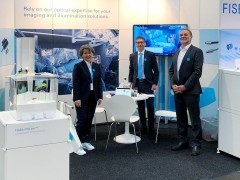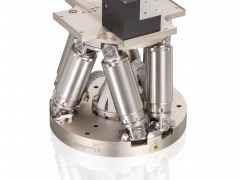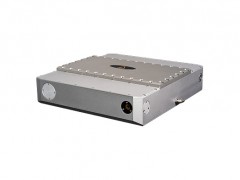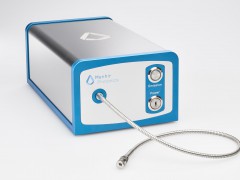
Fraunhofer institutes display new optics production methods at Optatec
source:electrooptics
release:Candice
keywords: Fraunhofer precision glass moulding
Time:2016-06-14
Fraunhofer IPT is demonstrating how the non-isothermal glass moulding process for the mass production of infrared optics is industrially viable. Fraunhofer ILT is highlighting its FreeformOPT software, designed to calculate freeform optics.
Precision glass moulding, in which a preform of chalcogenide glass is shaped in a glass mould press under the influence of heat, can reduce the high costs of manufacturing infrared optics, since the optical components are formed to specification in a single process step. The initial outlay for the manufacture of the pressing tools is swiftly recouped in high-volume production and reductions in the unit cost of the parts to a level which is acceptable for consumer goods.
The aim of the research and development work at the Fraunhofer IPT in Aachen is to increase the dimensional accuracy of the optics manufactured in non-isothermal glass moulding operations. As part of this development, forming tools made of new ceramic materials with particularly long service life are used in manufacturing processes, which have been specially adapted for these tools.
Fraunhofer IPT will be presenting tool systems and a machine for precision moulding infrared optics from chalcogenide glass at Optatec. In line with the aims of Industry 4.0, the company has developed a manufacturing concept that will allow large-scale manufacture of infrared optics in a controlled, cost-efficient and high-precision process.
The FreeformOPT software developed by Fraunhofer ILT in Aachen is also being presented at the show. The software allows various freeform optical surfaces to be calculated with more than 100,000 degrees of freedom, and also provides interfaces to CAD and optical software. The CAD drawings can be directly used on the appropriate production machines.
Also on display is the institute's research on new laser processes for shaping, polishing, structuring and assembling optics and components made of various optical glasses and fused silica. One focus is on developing a completely laser-based digital process chain for producing aspheres and freeform optics.
Various applications of glass frit bonding up to a size of 340 x 340mm are being exhibited by Fraunhofer ILT. The process involves the injection of laser light into a joint area to be used to obtain homogenous and crack-free joints, making it possible to encapsulate sensitive OLED layers or microsensors.
Robust optomechanical components that will be applied in pulsed lasers for satellite-based climate research will also be on display by Fraunhofer ILT. Special tilt stabilities of individual key components are achieved through solder joints. In addition, foregoing the use of organic substances achieves low outgassing rates and thus long service lives.
- RoboSense is to Produce the First Chinese Multi-beam LiDAR
- China is to Accelerate the Development of Laser Hardening Application
- Han’s Laser Buys Canadian Fiber Specialist CorActive
- SPI Lasers continues it expansion in China, appointing a dedicated Sales Director
- Laser Coating Removal Robot for Aircraft
 FISBA exhibits Customized Solutions for Minimally Invasive Medical Endoscopic Devices at COMPAMED in
FISBA exhibits Customized Solutions for Minimally Invasive Medical Endoscopic Devices at COMPAMED in New Active Alignment System for the Coupling of Photonic Structures to Fiber Arrays
New Active Alignment System for the Coupling of Photonic Structures to Fiber Arrays A new industrial compression module by Amplitude
A new industrial compression module by Amplitude Menhir Photonics Introduces the MENHIR-1550 The Industry's First Turnkey Femtosecond Laser of
Menhir Photonics Introduces the MENHIR-1550 The Industry's First Turnkey Femtosecond Laser of Shenzhen DNE Laser introduced new generation D-FAST cutting machine (12000 W)
more>>
Shenzhen DNE Laser introduced new generation D-FAST cutting machine (12000 W)
more>>
